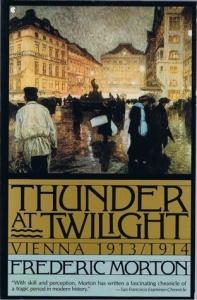 Thunder At Twilight: Vienna 1913-1914
Thunder At Twilight: Vienna 1913-1914
DA CAPO / Perseus / Hachette , 2014
Agent: Sandra Dijkstra
Thunder at Twilight is a landmark of historical vision, drawing on hitherto untapped sources to illuminate two crucial years in the life of the extraordinary city of Vienna—and in the life of the twentieth century. It was during the carnival of 1913 that a young Stalin arrived on a mission that would launch him into the upper echelon of Russian revolutionaries, and it was here that he first collided with Trotsky. It was in Vienna that the failed artist Adolf Hitler kept daubing watercolors and spouting tirades at fellow drifters in a flophouse. Here Archduke Franz Ferdinand had a troubled audience with Emperor Franz Joseph—and soon the bullet that killed the archduke would set off the Great War that would kill ten million more. With luminous prose that has twice made him a finalist for the National Book Award, Frederic Morton evokes the opulent, elegant, incomparable sunset metropolis—Vienna on the brink of cataclysm.
Reviews:
"In an astonishing work of literary energy and historical insight, the author of The Rothschilds brings us the backstage dynamics that preceded the assassination of Franz Ferdinand, heir to the Austro-Hungarian throne, the deed that precipitated WW I. Morton captures both the elegant decadence of Emperor Franz Joseph's Vienna, and the potent spirits of those revolutionary thinkers who, all in Vienna at some time during the two years before the war, would blow away the past and create modernity. There were Stalin, Trotsky and Lenin; Freud and Jung; the glowering Hitler; Kafka, Wittgenstein and Karl Kraus; and a small band of Serb nationalists, one of whom fired the shot that catapulted Franz Joseph, Kaiser Wilhelm and Tsar Nicholas into a war they didn't want but couldn't prevent, and that reduced them to puppets."
—Publisher's Weekly
"Like the author's earlier A Nervous Splendour: Vienna 1888-1889, which focused on the suicide of the Hapsburg Crown Prince Rudolph, this social history of the same city focuses on the events and personalities surrounding the assassination of the last Crown Prince, Franz Ferdinand. A remarkable procession of influential persons waltzed through Vienna during the two winter social seasons; some were already famous in their fields (Freud), others would only later attain powerful positions (Hitler). Extensively based on personal memoirs and contemporary periodicals, the work is less scholarly than Barbara Tuchman's The Proud Tower but adds a flavor which she omitted. It belongs in larger collections."
—Library Journal